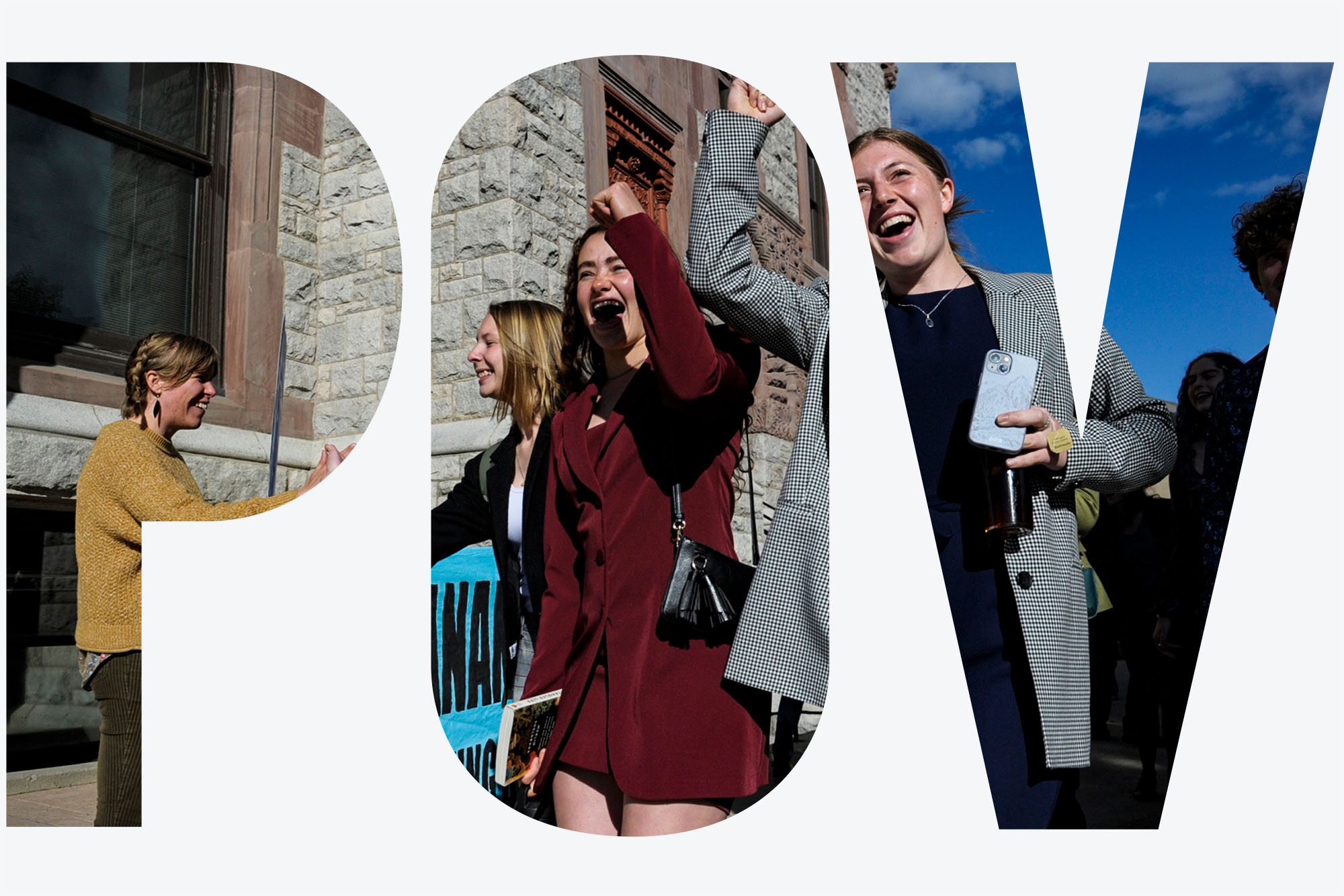POV: Montana Youths Sued State over Climate Change—and Won a Landmark Decision for All Young People

Youth plaintiffs in the climate change lawsuit Held vs. Montana arrive at Helena, Mont.’s Lewis and Clark County Courthouse on June 20, 2023, for the final day of the trial. On August 14, a Montana judge sided with young environmental activists, who said state agencies were violating their constitutional right to a clean and healthful environment by permitting fossil fuel development without considering its effect on climate. File photo by Thom Bridge/Independent Record via AP
POV: Montana Youths Sued State over Climate Change—and Won a Landmark Decision for All Young People
CAS student: “On our campus at Boston University, young people have taken the initiative for institutional change”
When a Montana judge ruled recently in favor of young environmentalists who had argued that the state failed to protect their constitutional right to a “clean and healthful environment,” it was a historic decision.
“As fires rage in the West, fueled by fossil fuel pollution, today’s ruling in Montana is a game-changer that marks a turning point in this generation’s efforts to save the planet from the devastating effects of human-caused climate chaos,” said Julia Olson, founder of Our Children’s Trust, the legal nonprofit group responsible for bringing this case to court. “This is a huge win for Montana, for youth, for democracy, and for our climate. More rulings like this will certainly come.”
I grew up in a town 30 minutes outside of Flint, Mich., where that neighboring community’s members were forced to familiarize themselves with the pressing need for a clean and healthful environment, which had come in response to decades of mounting water quality concerns.
Michigan is second only to Alaska in its abundance of fresh water, yet there were few regulations to make this fresh water safe in the early 2000s. This neglect forced my home state to take notice when a spill from Enbridge Oil contaminated the Kalamazoo River in 2010. This infrastructure-based disaster drew public concern; however, the community was equipped only to react to the crisis, not to take preventive action.
Come the fall of 2015, the Flint Water Crisis began, and a community of people were left with unsafe drinking and bathing water as a result of corroded pipes leaching lead and other contaminants into municipal sources. The scale of this crisis drew national headlines and caused floods of people to appeal at public hearings, but institutional change was sluggish.
Amidst climate disasters like the Flint Water Crisis, attitudes toward climate change of teens and young adults have become increasingly focused on advocacy efforts, exemplified by prominent figures such as the aforementioned Montana plaintiffs and activist Greta Thunberg. This trend of young people questioning the ethical practices (or lack thereof) of large oil, gas, and coal corporations speaks to a galvanized generation. Many of these are often concentrated on college campuses, where student-led clubs and organizations have access to the education and resources necessary to participate in climate-related discourse.
On our campus at Boston University, young people have taken the initiative for institutional change, namely in student-led advocacy efforts to divest BU from investments in fossil fuels companies. These efforts came to fruition as the University announced a complete divestment in the fall of 2021. Three months later, the city of Boston followed suit with a similar ordinance from Mayor Wu, demonstrating the impact that BU (and student-led organizations) can have on climate action.
These resources, however, are closely related to one’s access to education—access that is facing potential restriction through the Supreme Court’s recent decision to reverse affirmative action. Marginalized communities, which are often burdened with the repercussions of climate change (as in Flint), also have inequitable access to climate safety information and resources. Cyclically, these inequalities are best combated through community education and advocacy, furthering the importance of court cases such as the recent decision from Montana.
The ruling in Montana sets a precedent for other climate-related cases that rely on the semantics of their state constitution, and several of these cases are making their way through state courts in Utah, Virginia, and Hawaii. Such cases, which are brought forth by younger people, are a call to the need for intergenerational collaboration. An appeal for the future of those who will be participants in it relies on the decisions of those who have already passed their youth. In cases where legislation is required for change, rulings—like the one in Montana—can provide an exemplar for progress.
It is needlessly dismissive to imply that young people are exclusively impacted by, and pushing against, climate change. It is a multigenerational issue, and one that is well-researched and supported by science. At Boston University’s Institute for Global Sustainability, there are over 100 co-appointed faculty dedicated to conducting research on achieving a just and sustainable future. Scientifically based data that can explain and predict the state of the environment is constantly increasing and being publicly disseminated, so collective action toward an ecologically responsible and sustainable future is increasingly attainable.
Maura Lee (CAS’24) is an intern with BU Sustainability.
“POV” is an opinion page that provides timely commentaries from students, faculty, and staff on a variety of issues: on-campus, local, state, national, or international. Anyone interested in submitting a piece, which should be about 700 words long, should contact John O’Rourke at orourkej@bu.edu. BU Today reserves the right to reject or edit submissions. The views expressed are solely those of the author and are not intended to represent the views of Boston University.
Comments & Discussion
Boston University moderates comments to facilitate an informed, substantive, civil conversation. Abusive, profane, self-promotional, misleading, incoherent or off-topic comments will be rejected. Moderators are staffed during regular business hours (EST) and can only accept comments written in English. Statistics or facts must include a citation or a link to the citation.